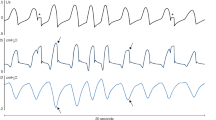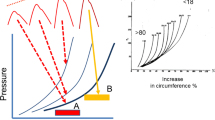Abstract
The main condition of completing the process of adaptation of the body to the effect of an external factor is the return of the homeostatic system parameters to their initial levels or their stabilization at a new level. The article considers the state of incomplete adaptation (IA) based on the process of the stabilization of systemic reactions (respiration and blood circulation) on repeated exposure to extreme environmental factors (hypoxia and cold) associated with the excitation of the central regulatory mechanisms of the respiratory center system performing a compensatory–protective function. It is postulated that a change in the afferent information flows (the thresholds of excitation and reactivity of the peripheral receptor systems) forms the basis of IA. The IA state is supposed to persist for an indefinitely long period of time due to insufficient functional reserves and to be the cause of psychosomatic pathology.
Similar content being viewed by others
REFERENCES
Slonim, A.D., Physiological Adaptation and Maintenance of Restorative Homeostasis, Fiziol. Chel., 1982, vol. 8, no. 3, p. 355.
Yakimenko, M.A., The Criteria of Adaptation to Cold, Byull. Sib. Otd. Akad. Med. Nauk SSSR, 1981, no. 6, p. 43.
Yakimenko, M.A., Simonova, T.G., Pichkurov, A.M., et al, The Influence of Adaptation to Cold on External Respiration Parameters, Fiziol. Chel., 1989, vol. 15, no. 5, p. 148.
Meerson, F.Z., Basic Regularities of Individual Adaptation, Urgent and Long-Term Adaptation Stages, in Fiziologiya adaptatsionnykh protsessov. Rukovodstvo po fiziologii (Physiology of Adaptation Processes: A Manual of Physiology), Moscow: Nauka, 1986, p. 10.
Leblanc, J., Adaptation of Man to Cold, Hudson, W.W., Ed., New York: Academic, 1978.
Leblanc, J., High-Altitude Medicine, Ueda, G. et al., Eds., Matsumoto: Shinshu Univ., 1992, p. 475.
Bruck, K., Baum, E., and Schwennicke, H.P., Cold-Adaptive Modifications in Man Induced by Repeated Short-Term Cold Exposures and during a Ten-Day and Night Cold Exposure, Pfluegers Arch., 1976, vol. 363, no. 2, p. 125.
Wood, S.C., Interaction between Hypoxia and Thermoregulation: Oxygen Transport, Program Lobelace Medical Foundation: Annual Review of Physiology, Albuquerque, 1991, no. M87108.
Krivoshchekov, S.G., Neshumova, T.V., and Razumenko, A.S., High-Altitude Adaptation and Physical Working Capacity, Fiziol. Chel., 1992, vol. 18, no. 1, p. 64.
Krivoshchekov, S.G., Roach, R.C., Divert, G.M., et al., Physiological Mechanisms of Respiration and Thermoregulation at an Early Stage of Adaptation to Cold, Fiziol. Chel., 1993, vol. 19, no. 6, p. 51.
Krivoshchekov, S.G., Divert, G.M., and Neshumova, T.V., Regulation of Respiration on Exposure to Cold and Hypoxia, Byull. Sib. Otd. Ross. Akad. Med. Nauk, 1995, no. 3, p. 64.
Krivoshchekov, S.G. and Divert, G.M., The Effect of Cold on the Regulation of Respiration in Humans, Byull. Sib. Otd. Ross. Akad. Med. Nauk, 1997, no. 3, p. 5.
Krivoshchekov, S.G., Roifman, M.D., Divert, G.M., et al., Systemic Reactions and Central Mechanisms of Regulation in Adaptation to Cold and Hypoxia, Vestn. Akad. Med. Nauk, 1998, no. 9, p. 48.
Krivoshchekov, S.G., Domakhina, G.M., and Divert,G.M., Specific Features of Regulation of Physiological Functions during Adaptation to Expedition and Shift Work, Gig. Tr. Prof. Zabol., 1984, no. 4, p. 15.
Divert, G.M., Domakhina, G.M., and Krivoshchekov, S.G., Individual and Typological Features of the Cardiovascular System Response to Local Cooling in Expedition and Shift Workers, 1989, no. 10, p. 25.
Divert, G.M. and Krivoshchekov, S.G., The Influence of Translatitudinal Travels on Certain Heat Exchange Parameters in Humans, Fiziol. Chel., 1988, vol. 14, no. 2, p. 231.
Krivoshchekov, S.G., Shmerling, P.M., Pichkurov, A.M., and Tataurov, Yu.A., The Dynamics of the Body Energy Characteristics During Transmeridian Travels of Humans, Fiziol. Chel., 1989, vol. 15, no. 6, p. 56.
Krivoshchekov, S.G., Leutin, V.P., and Chukhrova, M.G., Psikhofiziologicheskie aspekty nezavershennykh adaptatsii (Psychophysiological Aspects of Incomplete Adaptations), Novosibirsk, 1998.
Krivoshchekov, S.G. and Okhotnikov, S.V., Proizvodstvennye migratsii i zdorov'e cheloveka na Severe (Production Migrations and Human Health in the North), Novosibirsk, 2000.
Leblanc, J. and Labrie, A., Glucogen and Nonspecific Adaptation to Cold, J. Appl. Physiol., 1981, vol. 51, no. 6, p. 1428.
Meerson, F.Z. and Larionov, N.P., The Role of Glycogen in the Energy Provision of the Contractile Function of the Heart, Kardiologiya, 1960, no. 1, p. 17.
Viola-Magni, M.P., A Radioautographic Study with H 3–Thymidine on Adrenal Medulla Nuclei of Rats Intermittently Exposed to Cold, J. Cell Biol., 1966, vol. 19, no. 1, p. 9.
Slonim, A.D., Chastnaya ekologicheskaya fiziologiya mlekopitayushchikh (Special Ecological Physiology of Mammals), Moscow: Akad. Nauk SSSR, 1962.
Agadzhanyan, N.A., Adaptatsiya i rezervy organizma (Adaptation and Body Reserves), Moscow: Fizkul'tura i Sport, 1983.
Avtsin, A.P., Marachev, A.G., and Matveev, L.N., Circulatory Hypoxic Syndrome, Vestn. Akad. Med. Nauk SSSR, 1979, no. 6, p. 32.
Kim Len, B., Kulikov, V.Yu., and Kim, E.B., External Breathing and Red Blood Patterns in Patients with Chronic Nonspecific Diseases in the Far North, ICCH 11, The Millennium Congress, Harrstad, Norway, June 4–9, 2000, Abstract 223.
Shishkin, G.S., Preobrazhenskaya, V.K., and Kulichevskii, D.V., Mobilization of the Functional Reserve of Respiratory Lung Divisions in Adaptation to the Climatic Factors of the North, in Ocherki po ekologicheskoi fiziologii (Essays on Ecological Physiology), Trufakin, V.A. and Shoshenko, K.A., Eds., Novosibirsk: Sib. Otd. Ross. Akad. Med. Nauk, 1999, p. 112.
Panin, L.E., Voprosy ekologii cheloveka v usloviyakh Krainego Severa (The Problems of Human Ecology under the Extreme North Conditions), Novosibirsk: Nauka, 1979.
Boiko, E.R., The Metabolic Background of Human Adaptation in the Circumpolar Area, ICCH, The Millennium Congress, Harrstad, Norway, June 4–9, 2000, Abstract 87.
Soroko, S.I., Neirofiziologicheskie mekhanizmy individual'noi adaptatsii cheloveka v Antarktide (The Neurophysiological Mechanisms of Individual Adaptation of Humans in the Antarctic), Leningrad: Nauka, 1985, p. 119.
Leutin, V.P. and Nikolaeva, E.I., Psikhofiziologicheskie mekhanizmy adaptatsii i funktsional'naya asimmetriya mozga (Psychophysiological Mechanisms of Adaptation and Functional Asymmetry of the Brain), Novosibirsk: Nauka, 1988.
Ilyukhina, V.A., Prerequisites for and Prospects of Studying the Physiological Aspects of the Problem of Energy Deficit in Asthenic States of Healthy and Ill Individuals, Fiziol. Chel., 1995, vol. 24, no. 1, p. 143.
Pogodaev, K.I. and Turova, N.F., Biokhimiya mozga pri utomlenii i istoshchenii (Biochemistry of the Brain in Fatigue and Exhaustion), Moscow: Meditsina, 1972.
Zabolotskikh, I.B., Physiological Basis of Differences in the Functional States in Healthy and Sick Individuals with Different Tolerance of Hypercapnia and Hypoxia, Doctoral (Med.) Dissertation, St. Petersburg, 1993.
Yakimenko, M.A. and Simonova, T.G., Thermoregulation and Respiration in Problemy termoregulyatsii i temperaturnoi adaptatsii (The Problems of Thermoregulation and Temperature Adaptation), Novosibirsk: Institute of Cytology and Genetics Sib. Otd. Akad. Nauk SSSR, 1992, p. 24.
Slonim, A.D. and Shvetsova, E.I., Chemical Thermoregulation after an “Accelerated” Adaptation to Cold, Fiziol. Zh. SSSR, 1973, vol. 59, no. 8, p. 1262.
Pastukhov, Yu.F., Physiological Adaptations to Cold: Comparative and Methodological Aspects, in Problemy termoregulyatsii i temperaturnoi adaptatsii (The Problems of Thermoregulation and Temperature Adaptation), Novosibirsk, 1992, p. 158.
Khaskin, V.V., Energetika teploobrazovaniya i adaptatsiya k kholodu (Energetics of Heat Production and Adaptation to Cold), Novosibirsk: Nauka, 1975.
Hurtado, A., A Handbook of Physiology, Sect. 4: Adaptation in the Environment, Washington, 1964, p. 843.
Kolchinskaya, A.Z., Hypoxic Hypoxia, Exercise-Induced Hypoxia: The Alteration and Constructive Effects, Zh. Med. Gipoks., 1993, no. 3, p. 8.
Hakket, P.H. and Roach, R.C., High-Altitude Pulmonary Edema, J. Wilderness Environ. Med., 1990, vol. 1, no. 3, p. 1.
Serebrovskaya, T.V., The Sensitivity to the Hypercapnic and Hypoxic Stimuli as a Reflection of Individual Resistance of Human Body, Patol. Fiziol. Eksp. Ter., 1985, no. 5, p. 65.
Bazhenov, Yu.I. and Bocharov, M.I., The Influence of High Mountains on the System of Thermoregulation, Fiziol. Zh. SSSR, 1980, vol. 66, no. 10, p. 1541.
Blatteis, C.M. and Lutherrer, L.O., Effect of Altitude Exposure on Thermoregulatory Response of Man to Cold, J. Appl. Physiol., 1976, vol. 41, no. 6, p. 848.
Leutin, V.P., Platonov, Ya.G., Divert, G.M., et al., Inversion of Hemispherical Dominance as a Psychophysio-logical Mechanism of Interval Hypoxic Training, Fiziol. Chel., 1999, vol. 25, no. 3, p. 65.
Sergievskii, M.V., Dykhatel'nyi tsentr mlekopitayushchikh zhivotnykh (Mammalian Respiratory Center), Moscow: Medgiz, 1950.
Breslav, I.S. and Pyatin V.F., Regulation of Respiration, in Fiziologiya dykhaniya (Physiology of Respiration), St. Petersburg, 1994, p. 416.
Volozhin, A.I. and Subbotin, Yu.K., Adaptastiya i kompensatsiya-universal'nyi biologicheskii mekhanizm prisposobleniya (Adaptation and Compensation: Universal Biological Mechanism of Adaptation), Moscow: Meditsina, 1989.
Il'yuchenok, R.Yu., Finkel'berg, A.L., Il'yuchenok, I.R., and Aftanas, L.I., Vzaimodeistvie polusharii mozga u cheloveka (Interaction of the Cerebral Hemispheres in Humans), Novosibirsk: Nauka, 1989.
Kovtun, L.T. and Krivoshchekov, S.G., Physiological Reactions of the Female Respiratory System to Additional Breathing Resistance, Fiziol. Chel., 1998, vol. 24, no. 3, p. 94.
Divert, G.M. and Krivoshchekov, S.G., Regulation of Respiration in Individuals with Hypothermic and Euthermic Reaction on Exposure to Cold, Fiziol. Chel., 1996, vol. 22, no. 6, p. 118.
Krivoshchekov, S.G. and Divert, G.M., The Influence of Acclimatization to Cold on the Hypoxic Sensitivity of the Respiratory Center, Fiziol. Chel., 1997, vol. 23, no. 1, p. 51.
Krivoshchekov, S.G., Divert, G.M., Platonov, Ya.G., et al., Compensatory and Systemic Reactions of Respiration and Blood Circulation in Incomplete Adaptation to Hypoxia, in Ocherki po ekologicheskoi fiziologii (Essays on Ecological Physiology), Trufakin, V.A. and Shoshenko, K.A., Eds., Novosibirsk: Sib. Otd. Ross. Akad. Med. Nauk, 1999, p. 126.
Author information
Authors and Affiliations
Rights and permissions
About this article
Cite this article
Krivoshchekov, S.G., Divert, G.M. Principles of Physiological Regulation of the Body Functions in Incomplete Adaptation. Human Physiology 27, 115–121 (2001). https://doi.org/10.1023/A:1007175828371
Issue Date:
DOI: https://doi.org/10.1023/A:1007175828371




